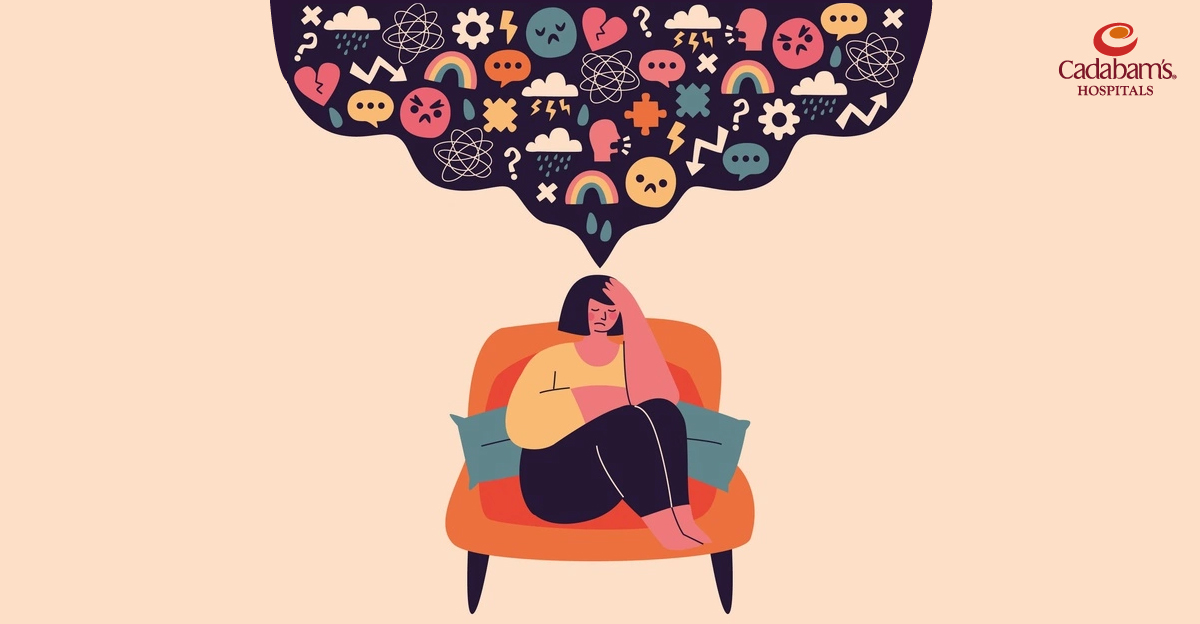Everything To Know About Stress: Causes, Symptoms, Treatment
What is Stress?
In this fast-moving world, stress has become an everyday occurrence. It has become a part of our daily life, decreasing our well-being and quality of life.
Stress is our body’s reaction to stressful, challenging situations, and life events. It can cause emotional, physical, and mental distress.
Due to a lot of stress, your body releases certain stress hormones that affect your long-term wellbeing and decreases your capability to cope with stressful situations. Long-term stress can put you at greater risk of succumbing early or developing certain illnesses.
Hence, it is essential that you learn how to effectively deal with stress.
Symptoms of Stress
You should watch out for these symptoms if you are chronically stressed every day:
The common symptoms of stress could be-
- Irritability
- Reduced performance
- Forgetfulness or reduced concentration
- Poor sleep. If you have a lot on your mind, and a lot going on in your life, sleep may be hard to come by. Rolling and turning at night, or just the inability to get good sleep can be a sign of stress.
- Digestive problems. There are various types of digestive issues that can be produced by stress such as heartburn, diarrhea, and stomach aches.
- Loss of appetite or increased appetite. You can understand yourself better than anyone else can. Pay attention and see if your normal eating patterns have changed. If you are feeling less or more hungry, or if you simply have been eating more or less often, this could be a symptom of stress.
- Chest Pain. This sign can be one of the most dangerous ones. There are many times when chest pain is created by stress, however, you should see your doctor as soon as possible to rule out other severe conditions.
- Decreased Immunity. If you've seen that you have become more sensitive to colds and the flu than usual, this could mean that your immune system is less prepared to fight off illness due to stress.
If you are experiencing some of the symptoms mentioned above, please make sure you consult a doctor or a mental health professional immediately.
We are here to help! Reach out to us @+91 97414 76476 for professional support in dealing with stress.
Causes of Stress
Just as each of us must decide the circumstances that cause stress, people need to consider how they respond to stress, and whether or not their responses need to be changed.
While stress strikes everyone differently, there are many causes of stress that can have an adverse impact, including:
- Bullying
- Work-related issues or workplace stress
- Losing a job
- Marital problems
- Breakup or divorce
- Loss of a family member
- Difficulty in school
- Family issues
- Excess work pressure
- Interpersonal conflicts
- And many other reasons
Effects of Stress
To make things worse, many people consider their stress to be a part of daily life and don't deem treatment as an option. Those who don't seek stress treatment risk memory loss, anxiety, irritability, and numerous other conditions which can, in turn, impact personal performance, interpersonal relationships, and your personality as a whole. These conditions can make each day harder to manage and turn everyday tasks into day-long battles.
Benefits of stress management therapy in Bangalore:
If you don’t learn to manage stress, then over time it can lead to some devastating mental and physical health issues.
Stress therapy can help with:
- Sleeping better
- Weight control
- Not falling constantly ill
- Reduced muscle tension
- A better mood
- Getting along with family and friends
Self-Help Tips for Stress
Stress is not unavoidable, you will find it in some aspect of your life. Even though you can’t run away from it, you can learn to deal with it positively. Read: How to Manage Daily Stress?
Coping with situations that make us tense is important for peace of mind. When this feeling arises, it's OK to temporarily put stress on the back-burner, but make sure you deal with it at some point. Here are some self-help tips for you to follow:
Planning your time:
This is where you need to be proactive with stress management therapy. You can start by thinking ahead about how you are going to use your time. Write a to-do list and figure out what's important. Go step by step, and finish your most important tasks first. You mustn’t set any over-the-top goals, you must be realistic about your tasks and how long they will take.
Preparing yourself:
Going into any situation without preparing yourself can be rather stressful. You need to plan for any event that you predict as stressful. For instance, an uncomfortable or stressful conversation with a loved one can be stressful and you need to prepare yourself by:
- Picturing the surrounding environment and what you want to talk about
- Think about the various ways the conversation will turn out, and your response to each situation
- Plan how you are going to end the conversation
Relax with some deep breathing and meditation:
Deep breathing and meditation help relax your muscles and clear your mind. Stretching and taking a hot shower can help you relax because stress can cause tension in your muscles.
Getting active:
Regular physical activity can help with stress therapy management. This is because it relaxes your muscles and enhances your mood. You can aim for at least thirty minutes of physical activity, every day. It can be something like taking a walk or going for a bike ride. Go for a physical activity that you enjoy, so that you feel like doing it every day.
Additional self-help tips you can try are:
- Find a new passion that will catch your interest and put your mind off stressful things
- Avoid too much intake of alcohol and caffeine and even illegal drugs as these things will only make things worse
- Avoid accepting responsibilities that are not yours
- Learn how to prioritize your tasks by doing them one at a time
- Relax, unwind, or do something enjoyable to keep your mind off things.
Treatment for Stress
Stress treatment involves understanding what triggers it, uncovering ways to cope, and usually just spotting ways you can unwind to better enjoy your life.
A combination of medication and counseling is effective in relieving the symptoms that people are experiencing and allowing them to function in everyday life.
Another method of stress treatment is to use varying methods of psychotherapy and support groups. There are cognitive-behavioral therapies, group therapy, individual therapy, occupational therapy, neurofeedback, relaxation techniques that are used to replace the negative thoughts with healthy ones so that they are not a danger to themselves or others.
How Can Cadabam's Hospitals Help You Deal with Stress?
Cadabam's Hospitals have the expertise and professional experience of more than 3 decades to help alleviate the stress you might be suffering from. We provide personal and modern treatments designed to fit each individual’s needs.
Psychologists can help ease personal stress through several specially designed services. These services focus on an individual's source of stress and provide them with the coping strategies needed to reduce daily stress. Various services offered by the psychologists at the Cadabam's Hospitals include, but are not limited to:
- Counseling sessions
- Stress management strategies
- Assessments
It is advisable to seek professional help if the stress is so critical that it creates a lot of anxiety or if it conflicts with your work, social interactions, and general, day-to-day functioning. If left untreated, stress can lead to constant headaches, increased blood pressure, heart disease, and hypertension and it can also upset your interpersonal relationships.
Timely treatment and professional support can help with better stress management. If you or your loved one is suffering from stress or want to know more about stress management programs, reach out to us @+91 9741476476.
doctors | Everything To Know About Stress: Causes, Symptoms, Treatment

Dr. Vijayalakshmi Kashi
MBBS, DPM
Consultant Psychiatrist

Renuka B H
M.Phil (RCI) in Clinical Psychology from IHBAS
Consultant Clinical Psychologist
Overcoming an addiction to alcohol can be a long and bumpy road. If you are willing to get the support you need and ready to stop drinking you can recover from alcoholism no matter how bad the addiction is or how powerless you feel. Most people with alcohol problems do not decide to make a big change out of the blue or transform their drinking habits overnight. However, once you have made the decision to change, the next step is to seek help as some people can stop drinking on their own while others need medical supervision in order to withdraw from alcohol safely and comfortably.
There’s no magic bullet or single treatment that works for everyone. Everyone’s needs are different, so it’s important that you find a program that is right for you. Alcohol addiction treatment program should be customized to your unique problems and situation.
doctors talk | Everything To Know About Stress: Causes, Symptoms, Treatment
How to Build Self-Confidence in Children (for Parents) | Cadabams Hospitals
03 July,2023 | 10 months read

Stress Management for Pre-Teens & Teenagers | Improve Emotional Well-being
03 July,2023 | 10 months read

Managing Stress in Women | Essential Self-Care for Avoiding Burnout
03 July,2023 | 10 months read
